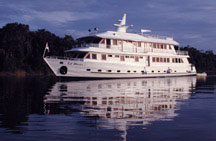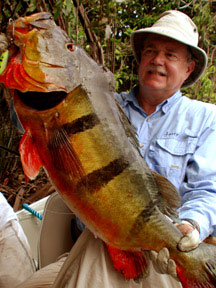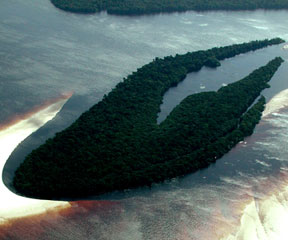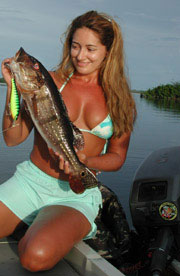|
Blackwater Voyage For Peacocks by Larry Larsen (c)
 The spot was ideal for big peacock bass. A brushy,
quick-dropping right-angle point bordered it on the right. On the left about 40 feet from the point were several giant, flooded hardwood trees that roughly defined a "cut" back into a large
"feeding flat". My partner, Gary Laden, and I had fished the edge of the flat with its enticing deep blackwater for about 300 yards without success. The spot was ideal for big peacock bass. A brushy,
quick-dropping right-angle point bordered it on the right. On the left about 40 feet from the point were several giant, flooded hardwood trees that roughly defined a "cut" back into a large
"feeding flat". My partner, Gary Laden, and I had fished the edge of the flat with its enticing deep blackwater for about 300 yards without success. As we approached the "cut", I suggested to Gary that he cast
to the left of center and I would take the right side, nearest the point. Our casts landed at about the same time, and a small four-pounder jumped on my topwater plug
immediately. I brought it to the boat where guide "Banana" quickly grabbed it with the Boga. Gary's second cast to the left side of the same area about 25 feet off the largest flood tree on the cut's
perimeter splashed down and he began his ripping cadence back to the boat. On his fifth rip, a giant fish blew up on his Woodchopper, missing the hardware. Temporarily out of
commission until Banana could get my smaller fish unhooked, I looked on in awe. My partner quickly shot another cast back to the spot and started to work his bait back to the boat. Banana finished his
task releasing my fish and I quickly tossed my Big Game Woodchopper toward the middle of the cut. Neither of us garnered a strike, so Gary switched to a diving minnowbait and we again fired our plugs
back deeper into the opening. I twitched my Fire Tiger-painted topwater and a massive peacock exploded on it. The fish tore off toward the brushy point as I hung on and tried to turn it. Fortunately, the
giant peacock turned at the edge of the brush without getting entangled and jetted back deeper into the cut pulling drag from my Morrum one-piece casting reel.
I had confidence in the smooth drag that I had cranked down to the max and in my 100 pound test braid, but a giant fish, if he gets into the nasty cover typical on Brazil's Rio Negro, can get off a number
of ways, including breaking the line and/or lure. The peacock was in dangerous territory (a large, brushy laydown being a few feet away) and moving at-will almost freely against my heavy rod action leverage and the drag.
Smoking Reel and Screams
 Putting some additional thumb "drag" on the spool, I stopped
the fish, and it turned. At that point, some 10 or 12 seconds into the battle, Gary screamed for Banana to move our boat out away from the flooded timber and brushy point. Putting some additional thumb "drag" on the spool, I stopped
the fish, and it turned. At that point, some 10 or 12 seconds into the battle, Gary screamed for Banana to move our boat out away from the flooded timber and brushy point.
"Rapido, rapido," he commanded our guide pointing toward the middle of the lagoon. "Good Job. Good Job." Banana was paddling like crazy, and I was still hanging on to a brute that then
took to the air before charging off in another direction. Taking a breath, Gary rooted me on, "Good Job Larry. Nice going. You got him now." The action did move out into deeper water with minimal
obstructions as the fish changed courses two or three more times, jumped twice again and then saw the boat. It again pulled drag for 10 feet or so, but it was far from worrisome
entanglements around the flooded trees at that time. After a couple of laps around the boat in open water, the fish and I had our proverbial boatside brawl wherein the fish and I tug back
and forth until the guide has a good shot at getting the net under the fish's head. Banana netted the monster with an entirely inadequate net – one that had the capacity to contain only
about one half of my fish. Fortunately, he was able to lift the fish swiftly into the boat without it literally falling out of the net. We weighed the peacock on our certified scales at 20 pounds even and took
several pictures before releasing the big fish.
Gary and I went on to catch 14 peacocks that day on the Rio Negro but we landed none even close to
the giant in weight. I had on another very big fish that simply pulled off the hook and swam off. The peacock had exploded on my faithful surface lure, getting us all excited as such strikes typically do, but
5 seconds into the battle, it pulled free. On the positive side of such an experience, our adrenalin is pumped for another hour or so afterwards. We are increasingly alert for similar action!
Action in the afternoon slowed, but we headed back to our houseboat very satisfied with the day. We had boarded the Amazon Voyager II, a beautiful 108-foot long yacht, in Manaus at daylight a few days
earlier and had boated up the Rio Negro in search of the prime areas for big peacock bass. We started fishing about 60 miles south of Barcelos and found the initial fishing very slow. Higher water in
the lower Negro during our visit and the area's proximity to several villages along the river always impacts the quality fishing found on the giant river. Mid-Lake Monsters Turn Quick
 Not all big fish were landed. On the third day, a
giant fish exploded on my big Woodchopper tossed down the middle of a small arm of a blackwater lagoon. It charged perpendicularly toward the nearest deepwater bank and a large,
brushy laydown as I reeled frantically to keep it from the obstruction. It ran into the limbs and bulled further into the brush. I kept a taut line on the fish and felt it tugged and pulling drag further
as my guide tried to paddle us toward the entanglement. Not all big fish were landed. On the third day, a
giant fish exploded on my big Woodchopper tossed down the middle of a small arm of a blackwater lagoon. It charged perpendicularly toward the nearest deepwater bank and a large,
brushy laydown as I reeled frantically to keep it from the obstruction. It ran into the limbs and bulled further into the brush. I kept a taut line on the fish and felt it tugged and pulling drag further
as my guide tried to paddle us toward the entanglement. My partner directed our guide to hurry over to the hung-up fish. As we approached, our guide stripped to his underwear and prepared to go
overboard after the fish. It was still tugging, but I regained line on my spool with steady rod tension. I had forced the huge fish back up to a
small limb and my guide grabbed one end to slowly raise it to the surface. Then, the fish turned quickly, and the tension was gone. Obviously, so was the fish.
We were all sick. The lure was removed from the small limb, and I examined it. The rear extra-strength eye screw holding the rear hook had been sheared off at its point of entry into the wooded plug. That
must have been quite a fish to break a heavy-duty eye screw half way up the shaft. The plug was new that morning. I have seen the rear eye screws pull out of the wood body after much wear and abuse
from peacocks, but this was the first time I have had a fish shear off the eye screw of a practically new plug! Comfort and Convenience
 Each night the beautiful Amazon Voyager II would motor 30 miles or
more to find unfished areas that might be more productive. We traveled as far as about 65 miles west northwest of Barcelos in the Amazonas state of Brazil. The Amazon Voyager provides first class
accommodations with a capacity of 9 to 14 anglers. There are 8 very comfortable, air-conditioned staterooms with complete private bathrooms in each. They are individually climate controlled. A
satellite phone is available at a minimal charge for use by guests. Other amenities include a tackle shop, VCR, satellite TV, dinning room, Lounge room, two decks with tables and chairs. Each night the beautiful Amazon Voyager II would motor 30 miles or
more to find unfished areas that might be more productive. We traveled as far as about 65 miles west northwest of Barcelos in the Amazonas state of Brazil. The Amazon Voyager provides first class
accommodations with a capacity of 9 to 14 anglers. There are 8 very comfortable, air-conditioned staterooms with complete private bathrooms in each. They are individually climate controlled. A
satellite phone is available at a minimal charge for use by guests. Other amenities include a tackle shop, VCR, satellite TV, dinning room, Lounge room, two decks with tables and chairs.
Fishing is from Brazilian-made 17 ½ foot fishing boats with 50 hp outboards, rear-mounted electric trolling motors, live wells, raised casting decks and swivel seats. While the Voyager is a relatively
new operation at the time of this writing, most of their 12 guides have at least 5 years experience guiding for other Amazon sportfishing operations. Their head guide from the Barcelos area is Zaca, a
veteran of 8 years at other operations. The fishing day generally runs from around 6:30 am to 5:30 pm and meals aboard the Voyager are served at 5:30 am and 7:30 pm. A box lunch and well-stocked cooler
is prepared for the fishing boats.
For more information on the current Voyager operations and trip availability,
contact Don Cutter, Peacock Bass Trips.com at 1-888-626-2966 or email him at peacockbasstrips@bellsouth.net Check domestic flight availability!. For more information on
peacock bass, check out www.peacockbassassociation.com or visit our book store for special savings on four peacock bass books! |
|

